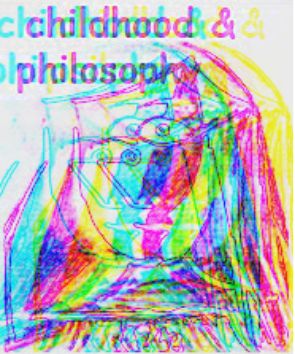philosophy for children: ethical-political seed of a peace culture
DOI:
https://doi.org/10.12957/childphilo.2024.78888Keywords:
pensamiento crítico, creativo y cuidadoso, cultura de paz, filosofía para niños, conflicto, apuesta ético-políticaAbstract
After teaching the subject of ethics in a formal way, and in applying traditional school family rules to daily life, students typically do not appropriate ethical principles, for several reasons: they do not see them as useful, they do not understand the context in which they are applied, or they simply do not affect them, thus nullifying any interest in exploring them. This prevents them from developing a peace culture in their school environment, and makes it difficult for the teacher to introduce and mediate behaviors embodying such a culture. Given this situation, Philosophy for Children (PfC) curriculum and pedagogy represent an ethical-political dispositif that allows for strengthening critical, creative and caring thinking, thus preparing the ground for a peace culture. Diego Pineda, the founder of PfC in Colombia, argues that it is necessary to develop thinking skills in students that, in addition to a knowledge of civics, lead them to make ethically sound judgments in the process of resolving conflict. The gradual development of dialogical thinking follows on the closeness among the members of the inquiring community, and the steady acquisition of cognitive and ethical skills, enhanced by the PfC facilitator’s use of the pedagogical tools of the program. As such, the practice of PfC acts to prepare students to assume reasonably argued positions as they face the inevitable conflicts that occur in a school setting, thereby enabling them to formulate arguments and to reach judgements enlightened by the inherent values of a functioning culture of peace.
Downloads
References
Bautista, O. (2007). Ética y Política: Valores para un buen gobierno. Encuentros Multidisciplinares, 27, 22-37.
Brenifier, O. (2011). Enseñar mediante el Debate. CECADFIN.
Cardona, M. (2011). La cultura para la paz en Colombia: retos y opciones desde una perspectiva psico-jurídica. Pensamiento Jurídico, 63-101.
Casado, Á., & Sánchez-Gey, J. (2003). Relatos filosóficos y educación para la paz: Anotaciones de una experiencia. Tendencias pedagógicas.
Constituyente, A. N. (1991). Constitución Política de Colombia. Bogotá D.C.: Procuraduría.
Lipman, M. (1982). La Educación para el pensamiento cuidadoso. En M. Lipman, Thinking in education (p.s. 1-10). Barcelona: Octaedro.
Lipman, M. (1988a). El descubrimiento de Harry. Madrid: Ediciones de la Torre.
Lipman, M. (1988b). Investigación ética - Manual del profesor para acompañar a Lisa. Madrid: Ediciones de la Torre.
Lipman, M. (2016a). El lugar del pensamiento en la educación. Barcelona: Octaedro.
Lipman, M. (2016b). Filosofía para niños, entrevista a Matthew Lipman. Tedium Vitae.
Mejia, A., Orduz, M., & Peralta, B. (2006). ¿Cómo formarnos para promover pensamiento crítico autónomo en el aula? Una propuesta de investigación acción apoyada por una herramienta conceptual. Revista Iberoamericana de Educación, 1-44.
MEN. (1998). Lineamientos curriculares de Educación Ética y Valores Humanos. Bogotá D.C.: MEN.
MEN. (2004). Estándares Básicos de Competencias Ciudadanas. Bogotá D.C.: Revolución Educativa.
MEN. (2014). Ley 1732 de septiembre 01 de 2014. Recuperado el 26 de agosto de 2019, de www.mineducacion.gov.co
MEN. (2016). Plan Nacional Decenal de Educación 2016-2026. Bogotá D.C.: AF&M Producción Gráfica S.A.S.
Velasco, C. (2019). Filosofía para niños: apuesta ético-política para transitar hacia una cultura de paz desde el pensamiento crítico, creativo y cuidadoso. (Tesis de maestría). Corporación Universitaria Minuto de Dios, Bogotá D.C - Colombia.
Moriyón, F. (2010). Filosofía para niños: genealogía de un proyecto. 15-40.
Moriyón, F., Colom, R., Magro, C., & Morilla, E. (2014). The Long-term Impact of Philosophy for Children: A Longitudinal Study (Preliminary Results). Analytic Teaching and Philosophical Praxis Volume 35, Issue 1, 50-55.
Nolla, N. (1997). Etnografía: una alternativa más en la investigación pedagógica. Educación médica superior, 1-5.
Nomen, J. (2021). El niño filósofo y la ética. Barcelona, España: Arpa & Alfil.
Pineda, D. (1992). Filosofía para niños: un acercamiento. Universitas Philosophica, 104-110.
Pineda, D. (2004a). Competencias ciudadanas: posibilidad y sentido . Colombia Aprende.
Pineda, D. (2004b). Filosofía para niños: el ABC. Bogotá: Beta.
Pinilla Muñoz, P. y Paniagua Freyle, R. (2010). Metodología de la Investigación (Fundamentos para Nivel de Especializaciones). Barranquilla, Colombia: Universidad Autónoma del Caribe.
Rojas, V. (28 de abril de 2019). Filosofía para Niños y Cultura de paz. (C. Velasco, Entrevistador)
González, S., & Mendez., D. (1998). Marco teórico del programa de filosofía para niños. 1-7. EE.UU.: Atlantic International University.
Fernández-Ríos, M. (1999). Aspectos positivos y negativos del conflicto. En J. F. Morales, S. Yubero Jiménez (Eds.). El grupo y sus conflictos. (Vol. 29, pp. 25-46). Obtenido de http://hdl.handle.net/10578/5031
Saber Pro ICFES. (2018). Marco de Referencia para la Evaluación ICFES. Bogotá: ICFES.
Sánchez, M., Fabián, M., Moreno, E., & Muñoz, J. (2017). Habilidades y estrategias para el desarrollo del pensamiento crítico. Educational Leadership, 21-39.
Sharp, A. (1991). La comunidad de cuestionamiento e investigación filosóficos: educación para la democracia. Thinking. The journal of Philosophy for children.
Splitter, L., & Sharp, A. (1995). La otra educación: Filosofía para niños y la comunidad de indagación. Buenos Aires: Ediciones Manantial.
Sumiacher, D. (2016). Prácticas filosóficas críticas y creativas. Journal of Humanities Theraphy.
Velasco, C. (2017). Filosofía para niños: Un reto para la educación ética y en valores. Universidad Santo Tomás.
Vélez, J. (1968). Curso de Filosofía. Bogotá: Bibliográfica Colombiana, Ltda.




